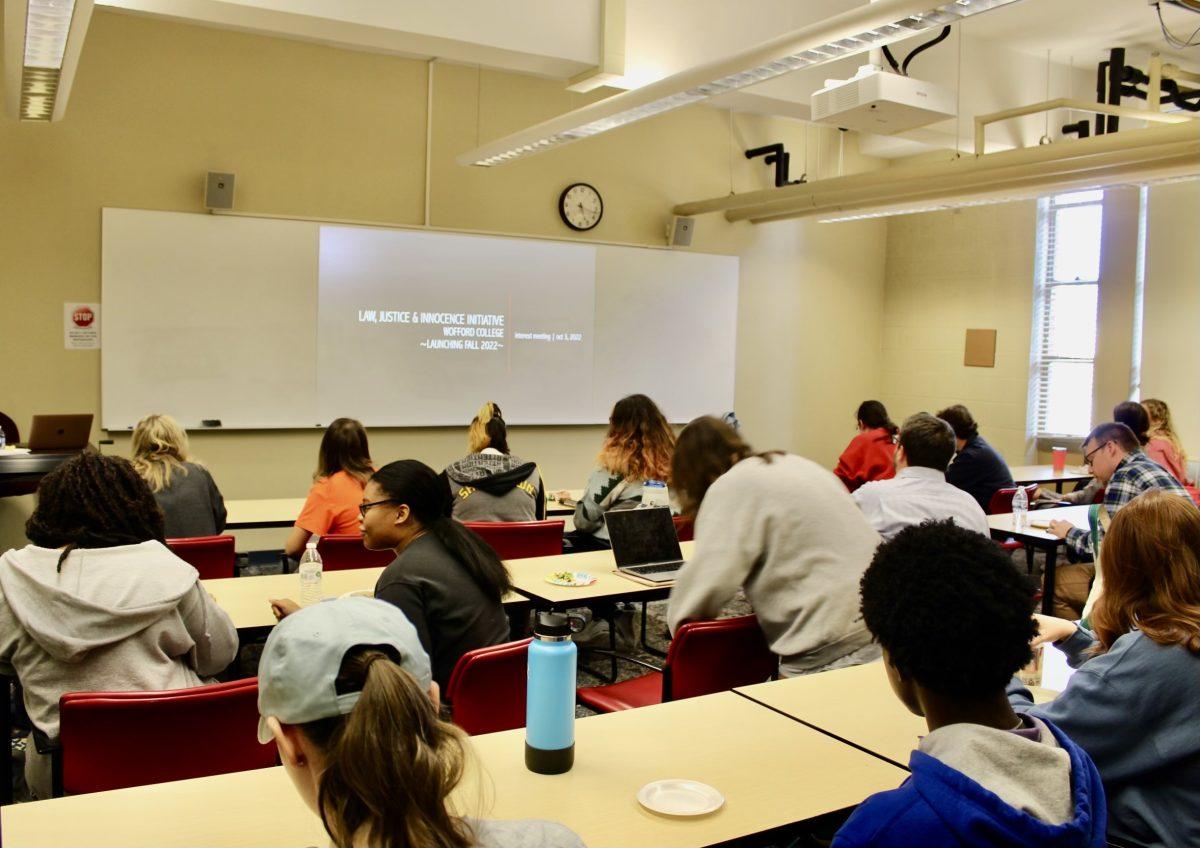An article by the staff of Innocence Project asserted in its subheader that innocent Black people are 19 times more likely to be wrongly convicted of drug crimes.
The article, “New Report High- lights Persistent Racial Disparities Among Wrongful Convictions,” cit- ed the National Registry of Exon- erations’ report that “about 69% of people exonerated from drug crimes (since 1989) were black and 16% were white, despite studies showing that white and black people use ille- gal drugs at similar rates.”
Wofford’s organization, Innocence & Justice Initiative, intends to advo- cate for innocent people and exoner- ees, as well as educate people on the racial disparities in those convicted and the flaws in the criminal justice system.
Dawn McQuiston, professor of psychology and coordinator of the pre-law program, is the director of the organization.
“Our work at Wofford is inspired by the work of the Innocence Proj- ect,” McQuiston said. “We want to examine the problem of wrongful conviction and advocate for justice.
McQuiston explained that organi- zations like this one are not usually formed at the undergraduate level, more often only available to gradu- ate law students.
The organization plans to put em- phasis on education of, outreach to and advocacy for exonerees and wrongfully convicted people.
“The data are what they are,” McQuiston said. “When you look at the stats of who is being let out of prison, it turns out more Black people were innocent than white people. We have a systemic race problem when it comes to criminal justice in this country.
“(Some people) don’t believe there’s a problem here, and it is exactly those people that need the education.”
McQuiston also asserted that forensic methods are being questioned and updated, specifically citing the flaws recently being found in the practice of analyzing fingerprints and fire-starters in arson cases. She also criticized some practices previ- ously treated as irrefutable.
“The number one factor in wrong- ful convictions is mistaken eyewitness identification,” McQuiston said. “In 70% of these (exoneration) cases, there was a mistaken eyewitness. In 50% of them, there was a problem with the forensic science.”
McQuiston explained that criminal justice is increasingly considering and examining human psychology’s effect on criminal cases. A person’s psychology can lead to problems such as incorrect accusations and false confessions.
“When McQuiston informed me of her idea to start the Law, Justice & Innocence Initiative, I knew it was my moral obligation to join,” said Gracie Hicks ‘23, the organization’s social media manager. “I learned about wrongful convictions while taking Psychology and The Law, and there were many instances in which my heart broke at the thought of someone suffering punishment for a crime they did not commit.”
Hicks expressed her disappointment that South Carolina is one of 15 states that does not provide compensation to the wrongfully convicted.
“The hardships innocent people suffer are present even after being released from prison,” Hicks said. “They have no choice but to re- build their lives from the ground up, often with little support. I hope the awareness (our organization) will bring to this matter will in- spire Wofford students to act.”
“I’m definitely very excited about getting involved in this initiative because I think it is such a cru- cial cause,” said Neeley Wilson ‘24, president of the organization. “Although innocent until proven guilty is the standard, we see far too many wrongful convictions. Wofford is a great place to start this initiative because of the pas- sion that can be found in many students, thus allowing the ability to both educate and advocate.”
Chelsea McNeill is circuit public defender for South Carolina’s 8th judicial circuit, which includes Laurens, Newberry, Abbeville and Greenwood counties.
She stressed the importance of this organization at the under- graduate level.
“The Innocence & Justice Initia- tive is so important because South Carolina doesn’t have an active organization that services people adversely affected by the judicial system,” McNeill said. “This or- ganization would most certainly bring better awareness to the le- gal community about the alarm- ing rate in which defendants are pleading guilty to crimes they did
not commit as well as those who are wrongfully convicted after a trial.”
McNeill also asserted that many Americans believe our country has the best criminal justice system in the world, which may encourage people to turn a blind eye to injus- tices within the system.
“How can education ever be a bad thing?” McNeill said. “We should encourage it and learn from our mistakes. Otherwise, we are com- plicit with accepting flaws in our hu- man-made justice system; a system which oftentimes isn’t ‘just’ at all.”
McNeill stated that it would be wonderful for undergraduates to get involved in the initiative, as they are the country and the world’s future.
She noted that getting involved as undergraduates would allow stu- dents to be armed with information as they enter their careers in law.
“I hope this program takes off at Wofford College,” McNeill said. “It would set Wofford apart from other institutions in this state as a leader in assisting with spotlighting what’s re- ally important in the criminal justice system: getting it right.”





























